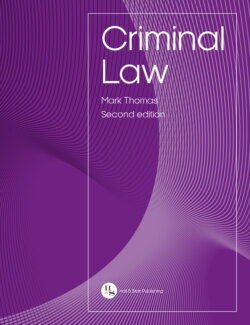Читать книгу Criminal Law - Mark Thomas - Страница 52
На сайте Литреса книга снята с продажи.
1.8.2 Mens rea
ОглавлениеRather loosely used to describe the ‘guilty mind’, the mens rea of an offence is the mental element of a crime, often requiring a defendant to intend the end result. Intention alone, however, does not satisfactorily encompass the spectrum of the mens rea. The first point to note is that the mens rea, like the actus reus, is unique to each particular crime. This was made clear by Lord Hailsham, in DPP v Morgan [1976] AC 182, who stated that ‘[t]he beginning of wisdom in all the “mens rea” cases … is … that “mens rea” means a number of quite different things in relation to different crimes’.
Take, for example, the mentes reae (plural of mens rea) of murder and common assault. Murder requires the intention to kill or cause grievous bodily harm (GBH), whereas the offence of common assault requires the intention to cause the apprehension of unlawful physical force or be reckless as to the thought of such apprehension occurring. As can be seen, both offences are unique in what is required to satisfy the mental element of the crime. The distinction between the two offences arises as a result of their classification as ‘specific’ and ‘basic’ intent offences, which we shall consider in Chapter 3.
Despite this, however, there are a number of concepts on which the mental element of a criminal offence is based; these are:
•intention;
•foreseeability;
•recklessness; and
•negligence.
We shall deal with each of these concepts in greater detail in Chapter 3 alongside the requirement of contemporaneity (or coincidence) of the actus reus and mens rea.
Importantly, as made clear above, there are offences that do not require any form of mens rea or fault. These offences are known as ‘strict liability offences’ and shall also be dealt with in Chapter 3. In summary, a defendant may be liable for a criminal offence simply by satisfying the actus reus without any corresponding mens rea. We shall also look at the term ‘absolute liability’ in Chapter 2 and compare that with strict liability.
